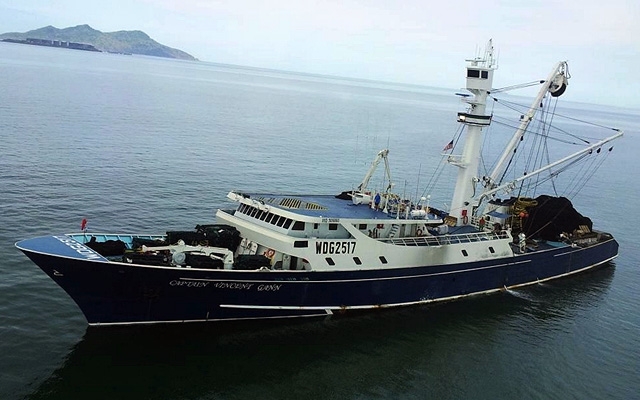A group of three tuna fishing companies, Tri-Marine Management Co., Tri-Marine Fishing Management, and Cape Mendocino Fishing - referred to collectively as Tri-Marine - have agreed to pay $1.05 million in fines, perform fleet inspections, and implement other corrective measures after one of their vessels was involved in a bunker spill in American Samoa.
The spill is said to have occurred on October 16, 2014, after Tri-Marine's 230 ft commercial tuna fishing vessel, the Capt. Vincent Gann, struck two moored fishing boats in the Pago Pago Harbor.

Image: trimarinegroup
The hull of the Capt. Vincent Gann is reported to have sustained damage during the collision, which resulted in 35 barrels of marine fuel, said to have been illegally stored in the vessel's bulbous bow, being spilled into the water.
The U.S. District Court for the District of Hawaii, which counts American Samoa within its jurisdiction, found Tri-Marine liable for the spill, as well as related violations under the U.S. Coast Guard's spill prevention regulations.
"This settlement sends a clear message to vessel owners and operators that they cannot put profits ahead of protection of the marine environment or compliance with the law," said Assistant Attorney General John C. Cruden of the Environment and Natural Resources Division of the U.S. Department of Justice (DOJ).
Tri-Marine will pay a significant penalty and conduct meaningful fleet-wide corrective measures for its release of oil into Pago Pago Harbor, a sensitive and valuable marine environment.
"We are grateful to our partner at the U.S. Coast Guard for their swift and diligent investigation of these violations," added Cruden.
Captain Shannon Gilreath, Sector Commander of the U.S. Coast Guard Honolulu sector, noting that storing oil in a vessel's bulbous bow has long been prohibited, commented that "this enforcement action reinforces this point and emphasises safety and pollution prevention measures within this fleet of vessels."
In January, the U.S. Environmental Protection Agency (EPA) issued its penalty policy for violations by ships of the 2015 Emissions Control Area (ECA) rules, subjecting non-complying ships to a maximum fine of $25,000 per violation, per day.
Source: shipandbunker.com